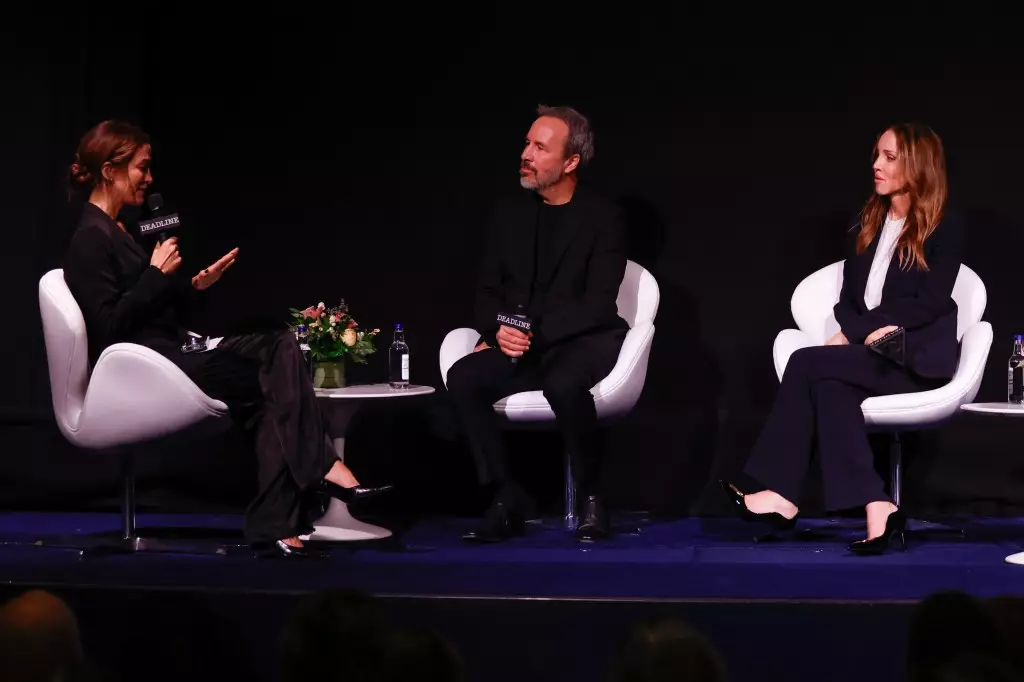The film industry often showcases grand narratives that weave together imaginative worlds with deep-seated themes. “Dune: Part Two,” directed by Denis Villeneuve, is a testament to this art form, bringing Frank Herbert’s rich literary world to life while igniting discussions about fundamental aspects of humanity—power, love, and the delicate fabric of existence. In a recent panel at Contenders London, Villeneuve, along with producers Mary Parent and Tanya Lapointe, delved into the intricate layers of the film and the intentions behind its creation.
Denis Villeneuve’s overarching commitment to remain faithful to Herbert’s vision is evident in his approach to “Dune: Part Two.” He describes the narrative as a cautionary tale—one that prompts viewers to consider the ramifications of charismatic leadership and the perilous intersection of religion and politics. The film’s protagonist, Paul Atreides, portrayed by Timothée Chalamet, embarks on a tumultuous journey of vengeance and moral complexity as he aligns with Chani and the Fremen. By centering the narrative around themes relevant to contemporary society, Villeneuve compels the audience to reflect on their own world, where the same challenges regarding power dynamics appear cyclical and persistent.
Mary Parent articulates the prescient nature of Herbert’s work, emphasizing that the challenges faced by humanity—power struggles, environmental stewardship, and interpersonal relationships—are remarkably similar to those in the modern era. The film resonates not only as an exquisite visual spectacle but also as a profound commentary on human nature and its flaws. The emphasis on these timeless concerns reflects how art can echo through decades, urging society to confront ongoing issues that stubbornly persist. The filmmakers intend for the audience to connect emotionally, even on a grand scale, by recognizing that such struggles transcend time and genre.
An intriguing facet of “Dune: Part Two” lies in its exploration of love amidst chaos. Villeneuve highlights the central theme of romance between Paul and Chani as a poignant counterbalance to the film’s darker elements. Rather than solely focusing on revenge and conflict, the film humanizes its characters by depicting their love story. This dual narrative of personal and societal struggle provides a rich tapestry for the audience to engage with, drawing them into the intimate dilemmas that accompany larger political movements. Parent championed this love story as a universal experience, amplifying the film’s relatability and emotional weight.
Another essential aspect of the discussion focused on the nature of power and the representation of women within the story. Tanya Lapointe emphasized the long-term consequences of power dynamics, illustrating how they are orchestrated over ages rather than through isolated events. The film’s portrayal of the Bene Gesserit exemplifies this theme, revealing the complex layers of power and agency wielded by women. Villeneuve and Lapointe’s dedication to ensuring that each female character possesses her own narrative arc emphasizes the importance of diverse perspectives within the framework of power. Lady Jessica, despite her affiliation with the Bene Gesserit, is depicted as a dynamic figure with her own ambitions and desires, darkening the lines between loyalty and self-interest.
While “Dune: Part Two” successfully encapsulates a multitude of themes in its storytelling, Villeneuve hints at exploring new aspects in potential future iterations. The possibility of delving into the subject of war evokes curiosity about character evolution and thematic expansion. War, as Villeneuve playfully notes, could be a pivotal element in future storytelling, posing questions about sacrifice, morality, and the consequences of conflict. The notion of continuing this saga signifies the filmmakers’ commitment to exploring the intricate interplay of personal and societal facets, thereby inviting audiences to journey deeper into this world.
“Dune: Part Two” stands as a monumental achievement in filmmaking, weaving together complex themes with unforgettable performances and breathtaking visuals. Villeneuve, Parent, and Lapointe have carefully crafted a narrative that oscillates between the intimate and the grandiose, urging audiences to reflect on the cycles of power, love, and human nature. As cinematic storytelling continues to evolve, “Dune: Part Two” serves as a shining example of how both science fiction and timeless human experiences can converge, reminding us of the narratives that shape our understanding of the world around us.

Leave a Reply